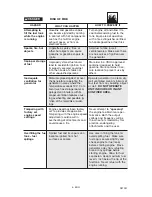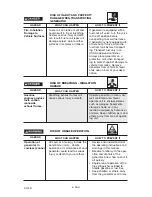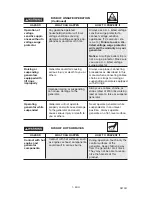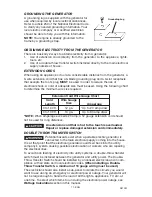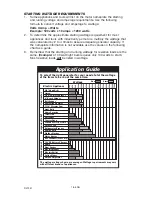
6- ENG
D27381
RISK OF UNSAFE OPERATION
HAZARD
WHAT CAN HAPPEN
HOW TO PREVENT IT
Operation of
generator in
careless manner
All sources of energy include the
potential for injury. Unsafe
operation or maintenance of your
generator could lead to serious
injury or death to you or others.
• Review and understand all of
the operating instructions and
warnings in this manual.
• Become familiar with the oper-
ation and controls of the
generator. Know how to shut it
off quickly.
• Equip area of operation with a
fire extinguisher certified to
handle gasoline or fuel fires.
• Keep children or others away
from the generator at all times.
RISK OF BREATHING - INHALATION
HAZARD
HAZARD
WHAT CAN HAPPEN
HOW TO PREVENT IT
Breathing exhaust fumes will
cause serious injury or death.
Operate generator in clean, dry,
well ventilated area. Never
operate unit in enclosed areas
such as garages, basements,
storage, sheds, or in any
location occupied by humans or
animals. Keep children, pets and
others away from area of operat-
ing unit.
Gasoline
engines produce
toxic carbon
monoxide
exhaust fumes.
RISK OF INJURY AND PROPERTY
DAMAGE WHEN TRANSPORTING
GENERATOR
HAZARD
WHAT CAN HAPPEN
HOW TO PREVENT IT
Fire, Inhalation,
Damage to
Vehicle Surfaces
Fuel or oil can leak or spill and
could result in fire or breathing
hazard, serious injury or death
can result. Fuel or oil leaks will
damage carpet, paint or other
surfaces in vehicles or trailers.
If generator is equipped with a
fuel shut-off valve, turn the valve
to the off position before
transporting to avoid fuel leaks.
If generator is not equipped with
a fuel shut-off valve, drain the
fuel from tank before transport-
ing. Transport fuel only in an
OSHA approved container.
Always place generator on a
protective mat when transport-
ing to protect against damage to
vehicle from leaks. Remove
generator from vehicle immedi-
ately upon arrival at your desti-
nation.





